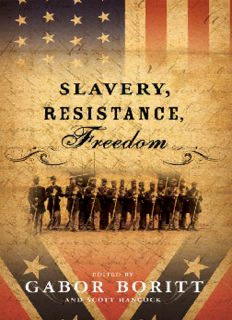
Slavery, Resistance, Freedom (Gettysburg Civil War Institute Books) PDF
Preview Slavery, Resistance, Freedom (Gettysburg Civil War Institute Books)
Slavery, Resistance, Freedom GettysburgCivilWar Institute Books Published by Oxford University Press Edited by Gabor Boritt Why the ConfederacyLost Lincoln,the War President Lincoln’s Generals WarComesAgain Why the Civil War Came The Gettysbury Nobody Knows Jefferson Davis’s Generals The Lincoln Enigma Other books by Gabor Boritt TheGettysburgGospel:TheLincolnSpeechthatNobodyKnows Lincoln and the Economics ofthe American Dream The Lincoln Image (with Harold Holzer and Mark E. Neely, Jr.) The Confederate Image (with Mark E.Neely, Jr., and Harold Holzer) The Historian’s Lincoln (with Norman O. Forness) The Historian’s Lincoln,Rebuttals: Whatthe University Press WouldNot Print Of the People, By the People,For the People and OtherQuotations from Abraham Lincoln (withJakobB.Boritt,DeborahR.Huson,andPeterC.Vermilyea) Slavery, Resistance, Freedom edited by GABOR BORITT and SCOTT HANCOCK essays by Ira Berlin John Hope Franklin and Loren Schweninger Scott Hancock Edward L. Ayers, William G. Thomas III, and Anne Sarah Rubin Noah Andre Trudeau Eric Foner 1 2007 1 OxfordUniversityPress,Inc.,publishesworksthat furtherOxfordUniversity’sobjectiveofexcellence inresearch,scholarship,andeducation. Oxford NewYork Auckland CapeTown DaresSalaam HongKong Karachi KualaLumpur Madrid Melbourne MexicoCity Nairobi NewDelhi Shanghai Taipei Toronto Withofficesin Argentina Austria Brazil Chile CzechRepublic France Greece Guatemala Hungary Italy Japan Poland Portugal Singapore SouthKorea Switzerland Thailand Turkey Ukraine Vietnam Copyright#2007byGaborBoritt PublishedbyOxfordUniversityPress,Inc. 198MadisonAvenue,NewYork,NY10016 www.oup.com OxfordisaregisteredtrademarkofOxfordUniversityPress Allrightsreserved.Nopartofthispublicationmaybereproduced, storedinaretrievalsystem,ortransmitted,inanyformorbyanymeans, electronic,mechanical,photocopying,recording,orotherwise, withoutthepriorpermissionofOxfordUniversityPress. LibraryofCongressCataloging-in-PublicationData Slavery,resistance,freedom/editedbyGaborS.Boritt;ScottHancock, assistanteditor;essaysbyIraBerlin...[etal.]. p. cm. Includesbibliographicalreferences. ISBN978-0-19-510222-2 1. Slavery—UnitedStates—History. 2. Slavery—UnitedStates—Historiography. 3. Memory—Socialaspects—UnitedStates—History. 4. Government,Resistanceto— UnitedStates—History. 5. Fugitiveslaves—UnitedStates—History. 6. Slave insurrections—UnitedStates—History. 7. AfricanAmericans—Socialconditions—To 1964. 8. UnitedStates—History—CivilWar,1861–1865—Participation,African American. 9. AfricanAmericanleadership—History—19thcentury. 10. Reconstruction (U.S.history,1865–1877) I. Boritt,G.S.,1940- II. Hancock,Scott. III. Berlin, Ira,1941– E441.S6442007 326.0973—dc22 2006038009 Maponpage104#2004NoahAndreTrudeau 9 8 7 6 5 4 3 2 PrintedintheUnitedStatesofAmerica onacid-freepaper To Tom Kemp and Ed Johnson By lateJune it is usually warm, Evenhot in Gettysburg. In the night atour farm, The firefliesglow inthe dark, Fleeting specks illuminating the woods and TurningMarsh Creek into a pageant. In the daytime along the side ofthe road, Orange tiger lilies proclaim their eternal message. My heart overflows; Itis time to see old friends again, Time to make new ones. Itis time for the Gettysburg Civil WarInstitute. gabor boritt Contents Acknowledgments ix Introduction xiii Scott Hancock 1. American Slaveryin History and Memory 1 Ira Berlin 2. The Quest for Freedom: Runaway Slaves and the Plantation South 21 John Hope Franklin and Loren Schweninger 3. ‘‘Tradition Informs Us’’: African Americans’ Constructionof Memoryin the Antebellum North 40 Scott Hancock 4. Black and on the Border 70 Edward L.Ayers, William G.Thomas III, and Anne Sarah Rubin viii / Contents 5. AStrangerin the Club: The Army ofthe Potomac’s Black Division 96 Noah Andre Trudeau 6. ‘‘The Tocsin of Freedom’’: The Black Leadership ofRadical Reconstruction 118 Eric Foner Notes 141 Contributors 163 Acknowledgments A ll knew,’’ Lincoln said in the spring of 1865, that slavery‘‘was,somehow,thecauseofthewar.’’1Thatwar,theonly oneinthehistoryoftheUnitedStatesinwhichallparticipantswere Americans,costmorethansixhundredtwentythousanddead,and a million and a half in total casualties. In a like war today, in a nation with a population of three hundred million people, those numbers would grow, proportionally, to five and a half million dead,andmorethanthirteenmillionintotalcasualties. Thosesoul-shatteringfigurespointtooneofthecostsofAmer- ican slavery. Of course Lincoln was wrong in saying that ‘‘all’’ knew.Neitherthennornowdoallknow,thoughinourtimemost professionalhistorians,atleast,havecometoacceptthecentrality of slavery to the Civil War. Indeed scholars have gone further, taking the words of Lincoln’s second inaugural address to their logicalconclusionbypicturingtheinstitutionofslaveryascrucial toallofU.S.history.Howeveruncomfortablethatthoughtstillis inthis twenty-first century, we can take comfort inknowing that Americansaretryingtofaceuptotheissuesspawnedbythis,the most dominant flawof a truly remarkablehistory. At Gettysburg, we celebrated the twentieth anniversary of the founding of the Civil War Institute at Gettysburg College by devotingaweeklongsessiontoAfricanAmericanhistory.Someof ix
Description: